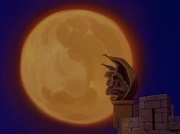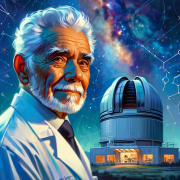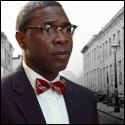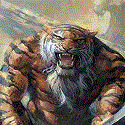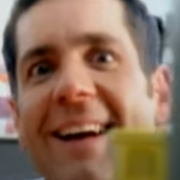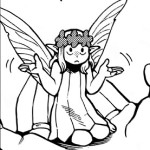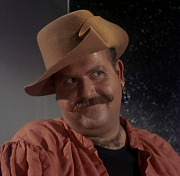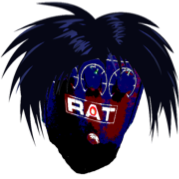|
jesus WEP posted:I just finished Slow Horses by Mick Herron and I liked the story and whatnot, but there was something about the author's style of writing that picked away at my enjoyment. Like he would build suspense in a kinda artificial way by just describing something poorly I've read all 8 of these that have been published by now, and I was going to post further thoughts after finishing the 8th one, but really I felt the same about the series after book 8 as I did after book 2. He's definitely figured out a format that works for him, but the biggest problem with it is that most of his characters are defined by a single characteristic. One's a recovering alcoholic, one's a cocaine addict, one's a gambling addict, in the later novels there's a character whose whole deal is that she's Too Beautiful To Be A Cop, Why Is She A Cop? (He at least makes her a competent cop, and in fact one of the most competent characters in the whole cast.) Meanwhile, his usual POV characters (River Cartwright and Louisa Guy) are total nothingburgers who have very little going on in their lives outside of work, except for maybe one significant relationship each. It's great for building suspense, as you never know which of these rather simple characters are going to make it out of each novel alive, but it sticks out like a sore thumb once you figure it out. The momentum of the plot definitely drives these books, not the characters. One thing I did appreciate is that the first two or three books somewhat lean on Jackson Lamb suddenly rising to the occasion and using his latent super-spy skills to start solving the plot's problems, but that gets toned way down by the later books. I don't think I would have stuck with it if it was always going to turn out to be the troglodyte rear end in a top hat boss saving the day. Book 7 was my favorite out of the lot, as it illustrates how an ambitious civil servant (Taverner who's established in the first book) might get lured into supporting burgeoning fascism, but due to the cast turnover, the series will make the most sense if read in order. If you didn't care for the first one, then it will probably be a slog getting that far.
|
|
|
|

|
| # ? May 29, 2024 09:50 |
|
The Wind-Up Bird Chronicle by Haruki Murakami Didn't like it at first but it grew on me, pulled me in. Plot seemed so dumb and the main hero a navel-gazing loser but nonetheless I wanted to know how it ends and kept on reading. The best were the parts on WW2 Japanese invasion of Manchuria/Manchukuo probably because Murakami had researched it so well, f.e., a chapter on how to supply enough wool for military gear in case of a winter battle against the Soviets.
|
|
|
|
Just finished Ursula Le Guin's bound three volume work Planets Of Exile and Illusion, the first three of the Hainish cycle. Very good stuff, especially the third book, City of Illusion
|
|
|
|
|
Just wrapped up Circle of Enemies, the third book in the Twenty Palaces urban fantasy series, by Harry Connolly and I think I'm putting the series down for a while. The first book is great and the premise of the main character being a decoy for the REAL badass is great. The issue is the Superman Problem, that is that any of the obstacles the main character runs into could easily dealt with by his boss. The story finds a way to sideline her whenever possible so that the MC can rise to the occasion. By the third book, his reputation is proceeding him, and somehow we're suppose to believe he's just a decoy who got lucky but at the same time is just taking apart bad guys way more powerful than him. It just snaps my suspension of disbelief. It's got good characters, interesting worldbuilding, neat magic. The ingredients are all here but it seems like Connolly only knows (or is only allowed) to make the same recipe every time.
|
|
|
|
Pessoa's "O banqueiro anarquista". I hope Elon Musk never reads it (doubtful as it's more than 2 pages and doesn't contain the gamer word) because he would quote the banker until the heat death of the universe.
|
|
|
|
Gleisdreieck posted:The Wind-Up Bird Chronicle by Haruki Murakami I was so bored by the main story but those Manchuria flashbacks were so good.
|
|
|
|
Recently finished Drive Your Plow Over the Bones of The Dead. Can't say I was enamored with it. It was a bit plodding and frequently regurgitated its themes. If I hadn't read a book I won't mention because knowing the title in this context is spoilers enough, I would have maybe enjoyed Drive a bit more. Unlike The 3 Body Problem books, I do think some of these issues can be attributed to translation.
|
|
|
|
Wrong thread, sorry 
Lex Talionis fucked around with this message at 04:40 on Dec 12, 2023 |
|
|
|
Also wrong thread  Hopefully a mod can delete these Hopefully a mod can delete these
Lex Talionis fucked around with this message at 04:41 on Dec 12, 2023 |
|
|
|
Last one, sorry
Lex Talionis fucked around with this message at 04:41 on Dec 12, 2023 |
|
|
|
Get your poo poo together Lex.
|
|
|
|
Une saison en enfer by Rambo. I'm glad it was short because the guy had nothing much to say and said it in a boring way and I don't just mean "as poems". The fact that he was one of the world's worst arms dealers is much more interesting. Also the translator left out at least one "Ah!" which of course makes the translation that much better but is wrong nevertheless. People and especially French people in the 1800s wrote complete rear end and it should not be hidden from the modern non-Francophone reader.
|
|
|
|
Midnight in Chernobyl by Adam Higginbotham told the stories of many people not featured in the HBO miniseries. I was particularly taken with the experience of Pripyat's city architect Maria Protsenko, who hurriedly sketched copies of the city maps for emergency personnel and had to see her life's work forever abandoned. Sad that she and other elderly survivors have now had their lives torn apart anew by war. Edit: Amused to see that the book's merits compared to other accounts are hotly debated on r/chernobyl. I've don't think I've ever seen another subreddit so closely focused on a singular historical event. FPyat fucked around with this message at 13:05 on Dec 12, 2023 |
|
|
|
Trainee PornStar posted:I've only read 3 Terry Pratchet books, The Colour of Magic, Pyramids & Mort. I finally got around to Discworld this year, starting with the Lipwig books followed by the Guardsmen stuff. I put off Pratchett for a long time. I assumed his books were full of obnoxious monkeycheese random humor, because everyone who recommended him to me was into that stuff and that’s the vibe I got when they explained the stories to me. Turns out the books are actually funny as hell!
|
|
|
|
Pratchett is cool because he'll write about a situation that seems totally monkeycheese lolrandom at first glance but it'll make total sense, have depth and meaning and pathos and make you laugh and cry. The Colour of Magic and The Light Fantastic are a bit less coherent than his later works and might put you off but the rest is so much better than you'd think.
|
|
|
|
Taeke posted:Pratchett is cool because he'll write about a situation that seems totally monkeycheese lolrandom at first glance but it'll make total sense, have depth and meaning and pathos and make you laugh and cry. The only Pratchett setup that I can think of that seems kinda monkeycheese in hindsight is the mall in Reaper Man, and the other half of that book is so good that doesn't even end up mattering to its overall quality e: I haven't read Reaper Man in forever though so maybe I'd have a new appreciation for it now
|
|
|
|
Arist posted:The only Pratchett setup that I can think of that seems kinda monkeycheese in hindsight is the mall in Reaper Man, and the other half of that book is so good that doesn't even end up mattering to its overall quality That was the first Pratchett book I read, as a teenager, and those bits just struck me as so stupid I didn't read anything else by him for ½ a decade or so.
|
|
|
|
Also, jesus christ, did I seriously just now realize that subplot is an extended reference to Dawn of the Dead?
|
|
|
|
Arist posted:Also, jesus christ, did I seriously just now realize that subplot is an extended reference to Dawn of the Dead? Oh I haven't seen it.
|
|
|
|
Arist posted:Also, jesus christ, did I seriously just now realize that subplot is an extended reference to Dawn of the Dead? I started reading Discworld when there were two books in the series, and I still occasionally find something I'd missed.
|
|
|
|
The Quiet Room by Terry Miles is the sequel to Rabbits, a book I reviewed on the last page. Unfortunately I didn't like this book as much, and for reasons I kind of expected: having explained what Rabbits (the in-setting ?game?) is in the last book, the sequel feels the need to escalate the stakes but fumbles at finding a plot that isn't just a retread of the first book, while also trying to avoid actually revealing anything new about the setting. A big part of what grabbed me about Rabbits (the book) was the eerie feeling of unease and trying to figure out what's going on. In this book both the reader and the protagonist know what kind of thing is going on so the book leans a lot more on generic action sequences and a deeper characterization for the main characters, which I feel that Terry Miles doesn't do as well. A disappointing sequel in my eyes, proof perhaps that Rabbits didn't need a sequel.
|
|
|
|
Good Omens and American Gods done back to back was a good time
|
|
|
|
The Search for Modern China by Jonathan Spence covers the last 400 years of the country's history. As a survey that has less than two pages per year to cover, it sacrifices depth, but it still had a ridiculous amount to teach me.
|
|
|
|
Slow Apocaplypse by John Varley. A rare non-sci-fi outing. The plot is an engineered bacteria was created to take out the Saudi Arabian oil supply by destroying all their crude oil as payback for the 9/11 attack (but only for a very specific reason). Unfortunately, the bacteria becomes airborne and ends up destroying all the crude oil in the world. The story centers around a Hollywood sitcom writer who discovers the truth early and takes measures to prepare and save his family. It then turns into a standard world-gone-to-hell story as the man, his family, and some of his surviving friends trying to find a place to settle. Not Varley's best work. For a brief moment, I expected the ending to be the writer to reveal this was all just a screenplay, but it didn't happen.
|
|
|
|
I just finished The woman in me by Britney Spears (read by Michelle Williams) God drat… I’ve never hated a man as much as I hate Jamie Spears.
|
|
|
|
Death Valley by Melissa Broder was an interesting journey. It's a novel about a novelist, but the meta angle isn't stressed enough to become pretentious. She is checking into a Best Western motel on the edge of Death Valley to get away from the simultaneous ill health of both her father and her husband. It starts off feeling like it owes a small debt to cyberpunk, as she simultaneously highlights both alienation and the experience of consumerism. Stuff like the ritual of stopping at a gas station for beef jerky and Red Bulls, and the mandatory customer service and individual quirks of the people working the front desk at Best Western. Quite a big deal is made out of daily Grab-N-Go breakfast bags. She also brings up the dopamine loop of endless scrolling on one's phone, and hilariously, throughout the book she continuously comes back to the unsatisfying experience of turning to Reddit for answers to life's questions. It all feels like Gibson or Stephenson being brought down to reality, their projected futures made real by the details of daily life that Broder chooses to highlight. After the first phase, though, it takes a hard turn into magical realism, as she crawls inside an impossibly gigantic cactus she discovers on a desert hiking trail and encounters various younger versions of the men in her life. Then, it becomes a straightforward but very well-paced tale of desert survival, after she upends her vacation plan and tries but at first fails to return to the cactus. Overall, it's a well-executed story about the main character progressing from pent-up selfishness to a greater acceptance of her life's circumstances, and it manages to capture the current zeitgeist a bit too well. I think I'd like to re-read this one 20 years from now and see how it holds up.
|
|
|
|
screenwritersblues posted:I just finished The woman in me by Britney Spears (read by Michelle Williams) The whole Britney Spears thing with her dad having legal control over her life is something I've found mildly interesting from what I've heard about it. As a bloke & not a fan of her music, am I likely to find it interesting?
|
|
|
|
Trainee PornStar posted:The whole Britney Spears thing with her dad having legal control over her life is something I've found mildly interesting from what I've heard about it. There are summary and recap articles online, from when the book came out. I'd suggesting reading one of those.
|
|
|
|
Megazver posted:There are summary and recap articles online, from when the book came out. I'd suggesting reading one of those. This would be a good way of doing it, but having her explain what it was like is even better.
|
|
|
|
Raven Stratagem by Yoon Ha Lee, part two of his "Machineries of Empire" trilogy. Not quite as good as the first book, I think mostly because you're now enmeshed in the way the setting works and don't have the novelty of learning what's going on, nor do you spend as much time with Cheris and Jedao as in the first book. For good reason - the book is mostly set around them, focusing on others dealing with their actions and plans. And the question of who "they" even are, because of the ending of the first book. I still liked it just fine, I enjoyed stuff from the perspective of the other characters and the look at how even a lot of the people in power in the Hexarchate absolutely hate the society but feel powerless to move against it. Or are rendered powerless by institutional momentum and the people around them who do enjoy the privileges of power. Feeling kind of compelled to revisit Murderbot before going on to the next book, though. Well, we'll see.
|
|
|
|
Sweetness and Power by Sidney W. Mintz, which I got as a gift some time ago and am finally clearing off my backlog. This book is apparently highly influential; it should not be. I started the book with great expectations as Mintz, an athropologist, described how he spent years doing sugar cultivation fieldwork in Puerto Rico, literally working the fields alongside multiple generations of impoverished laborers. ...but this was pretty much the only mention of Puerto Rico, or fieldwork, in the book. Nominally speaking, Sweetness and Power is a description of sugar and its relationship to humanity over time, particularly connecting the grower and consumer's respective experiences in the systems of capital. In practice, Mintz has written a terrible anthropology book that desperately wants to be a history book. Trying to be anthropological, the book is divided into chapters on the different roles of sugar: chapter 1 is "food, sociality, and sugar", chapter 2 is production, chapter 3 consumption, etc. However, because the topic is much too broad and historically focused to work with this anthropological organization, Mintz repeatedly re-tells the chronology of sugar in each chapter. The general scope of coverage is also lopsided: Mintz spends way, way more time on consumption than anything else (a full third of the book is this one chapter), and in practice almost all of the actual detailed research or sourcework goes into either early historical uses of sugar or, specifically and exclusively, changes in its use in Britain. While this is an important topic given sugar's role in the British empire's glory years, it's covered over and over again to the exclusion of other topics (like detailed information about cultivation or economics or trade or policy). A lot of the claims are reliant almost entirely on price or consumption stats, some of questionable quality. Organized entirely chronologically and without repetition, the book would probably be a third its length. I strongly suspect the root cause here is that Mintz dictated the book to someone and then just...didn't edit it. At one point Mintz uses the word drageoir for several paragraphs, then says he knows his audience doesn't know what the word means, and only then provides a definition. This isn't to prove a point or anything, he just...does it. This would make sense in a first draft being typed straight from a dictaphone; it makes no sense in a final publication. He has a distracting and infuriating tendency (in chapters 1, 2, 3, 4, and 5) to use interrupting parentheticals (for example, in chapters 1, 2, 3, 4, and 5) to repeat explanations or list sub-elements of a concept in multiple places (e.g. the different chapters of the book, the first, second, third, fourth, and fifth) even though it adds nothing to the thing being described - a practice he sometimes repeats multiple times on a page in each chapter, that is, the first, second, third, fourth, and fifth. It's like the fucker's trying to hit a pagecount. The above example is nowhere near as bad as it is in the text, where this sort of example occurs on multiple subjects, multiple times a page. If you want your audience to understand what context factors for food consumption are, you only need to give examples once! Not twenty times! If you say sugar was integrated into the activities of daily life, then yes, that's definitely a major thesis, and it may be worth repeating that assertion in multiple places. However, you do not need to give a list of daily life activities every time you say it! For an anthropologist playing at historian, though, Mintz is also a poo poo historian (and arguably a poo poo academic). He plays fast and loose with terminology and, most frustrating of all in a book that's got a serious bibliography, sometimes just spends a page or two making wild claims with no cited source. This gets especially infuriating in the final chapter, where the mask falls off and it becomes clear that Mintz is driven by an intense hatred of modern food and approaches to eating that don't involve people cooking their own food and eating together at set times. It gets seriously antimodern, and is all the more obnoxious because I know a decent amount about modern food science, business and policy, enough to know he's just wrong about a large number of the increasingly unsupported assertions he makes in this chapter (which makes me doubt the rest). Most of his observations about the US and modern food practices are completely worthless because he knew absolutely nothing about US ag policy and its effects on commodities. Here's the useful takeaways:
Discendo Vox fucked around with this message at 08:55 on Jan 13, 2024 |
|
|
|
I've just finished Freedom by Daniel Suarez, it's the sequel to Daemon. It needs a bit of suspension of belief but I really enjoyed it, it's one of the rare occasions where the sequel lives up to the original. I really like the way it uses augmented reality, some of the tech is a bit wishful thinking but as said, a bit of suspension of belief works wonders. If you liked the 1st one you'll enjoy the 2nd.
|
|
|
|
Americana by Don DeLillo A young TV executive goes on a road trip through the US and meets all sorts of characters along the way. I found DeLillo's prose hard to read and trippy but it's quite original.
|
|
|
|
Just posted about it in the lit thread but When We Cease to Understand the World by Benjamín Labatut. Really engaging. I guess I would call it historical fiction but there is much in it that is apparently true - but it's not really the kind of work that compelled a layman like me to verify which parts were and weren't based on research. Hard to describe what kind of read it was - it felt rewarding to read quickly, and the prose was tight and engaging enough without tipping into heavy density. I went and borrowed The Maniac, his 2023 release, from the library right after. And then I found out both of these books have been on Obama's year-end lists, so I'm a little annoyed that Obama's social media team has decent taste in books I guess
|
|
|
|
Over the weekend I read books one through four and book six of the Earthsea series. Weirdly, we had The Farthest Shore (book three) in my house when I was growing up and none of the others, so I'd read that previously. Four and six are alright, but the original trilogy remains fantastic over fifty years after publication. I read them on my Kobo but absolutely will buy some hard copies, it's something I want around when Tet Jr is old enough to be poking around for something to read.
|
|
|
|
Doc Fission posted:Just posted about it in the lit thread but When We Cease to Understand the World by Benjamín Labatut. Really engaging. I guess I would call it historical fiction but there is much in it that is apparently true - but it's not really the kind of work that compelled a layman like me to verify which parts were and weren't based on research. Hard to describe what kind of read it was - it felt rewarding to read quickly, and the prose was tight and engaging enough without tipping into heavy density. I just finished this the other day, too! It was fully engaging, like you said. I blazed through it and could hardly stop. Adjacent to a psuedo-documentary, with a slight hint of magical realism? But really that flavor seemed to exist in service to the wildness and mystery of subatomic physics. I had no idea about his other works, I'm definitely adding The Maniac to the list.
|
|
|
|
Trainee PornStar posted:I've just finished Freedom by Daniel Suarez, it's the sequel to Daemon. Yes, this was a fun duology. I'd peg Suarez as a more cartoony version of Clancy, or Crichton when he's in Congo/Jurassic Park mode. A couple years ago, I got his more recent Change Agent out of the library, about a future in which CRISPR-style gene editing technology is ubiquitous with governments unsuccessfully trying to keep it under strict control. It definitely demands even more suspension of disbelief, but it's a fun romp through cyberpunk (genepunk?) Southeast Asia.
|
|
|
|
Cosmopolis by Don DeLillo. I enjoyed this novel a lot more than I did Americana. The latter was his first book and this one is his 13th so I suppose his style got better. But the plot is similar, a powerful, rich, young man goes on a downward spiral while encountering characters speaking in eerie philosophical monologues. Saw the movie adaptation by David Kronenberg starring Robert Pattinson. Pretty good but there was mass naked bodies scene missing which was disappointing.
|
|
|
|
Just read The Obsecration by Matthew Bartlett. He writes weird, surrealist horror set in Western Massachusetts set around a town called Leeds, where he has over time built up a bit of a mythology. Its dumb fun if you like this sort of thing
|
|
|
|
|

|
| # ? May 29, 2024 09:50 |
|
last book i finished was My Dark Vanessa which i really enjoyed. now fittingly enough i'm reading lolita which like... i enjoyed the initial flowery prose parts but now it's just straight up horrifying. going to force myself to finish it so i can get it out of the way-- i am interested in other nabokov books, pale fire and glory mainly, so i figure it's worth finishing. the ornate prose is lovely when it's visual but like im already a person with ADHD i don't need the constant digressions.
|
|
|



